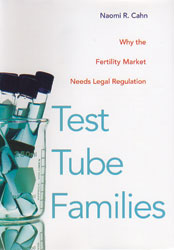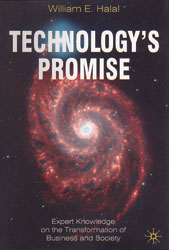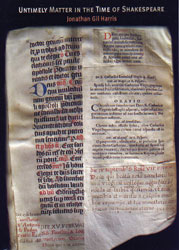21st-Century Dilemmas
 The laws that govern the rights as parents and guardians have been carefully tweaked for centuries. Now, with biological technology aiding parent-hopefuls in conceiving babies, impregnating surrogates, and using purchased sperm or eggs, the once-clear identification of “parent” gets fuzzy.
The laws that govern the rights as parents and guardians have been carefully tweaked for centuries. Now, with biological technology aiding parent-hopefuls in conceiving babies, impregnating surrogates, and using purchased sperm or eggs, the once-clear identification of “parent” gets fuzzy.
For instance, should recipients of sperm or eggs be allowed to choose their donor based on looks or smarts? Should an anonymous donor stay anonymous in the case of genetic disease? Does a child have the right to know the identity of his or her gamete donor?
GW Law professor Naomi Cahn helps sort through the legal disorder with her book Test Tube Families (New York University Press, 2009). Cahn investigates the gamete market—sperm banks, egg sales, and surrogacy—as well as family relationship and identity complications that arise from reproductive technologies.
The law professor uses real-life situations to illustrate how our new era of doctor-aided conception—and the multibillion-dollar fertility industry in the United States—leaves legal loopholes and unresolved questions embedded in “piecemeal” legislation. In the book, Cahn describes one family with a donor-conceived daughter who struggled in the courts to find out medical information about the anonymous donor—information that could help the daughter who had inherited an unusual genetic disorder. In another instance, a surrogate mother refused to give up a child she bore for another couple. Another family with lesbian parents, who used reproductive technology, encountered legal custody uncertainty after the parents separated.
The answers to such questions might be clearer if state laws were the same across the country, Cahn writes. That’s why she advocates for federal regulation of reproductive technologies. She also calls for legal reforms, such as an end to donor anonymity.
“There is comparatively little legal regulation of any aspect of this industry and its participants,” writes Cahn, who speaks from experience as well as law expertise. She had her own success with reproductive technology in the form of in vitro fertilization. “The law has been in a catch-up mode, not a shaping mode.”
Cahn is the John Theodore Fey Research Professor of Law at the GW Law School.
Glimpse of the Future
 “Just a few decades ago, we were perfectly content using slide rules and calculating machines, typing pools, and a few major TV networks,” writes William Halal in his new book, Technology’s Promise (Palgrave Macmillan, 2008).
“Just a few decades ago, we were perfectly content using slide rules and calculating machines, typing pools, and a few major TV networks,” writes William Halal in his new book, Technology’s Promise (Palgrave Macmillan, 2008).
Now, advances in technology are snowballing, and Dr. Halal, GW professor emeritus of science, technology, and innovation, explains how the planet is transitioning into a world that can withstand our burgeoning population and resource demands. His crystal ball is the TechCast Project, which he conducted over the past decade at the University. The science-based forecasting project compiles technology predictions from some 100 top international experts in fields ranging from medicine to computer technology, transportation, engineering, space, artificial intelligence, and more.
Some future technologies are already in development: Scientists at the University of California are using nanotechnology and microbiology to build tiny robotic devices 50 nanometers wide that flow through a bloodstream on a search-and-destroy mission for cancer cells, Dr. Halal writes.
In Technology’s Promise, Dr. Halal’s science-based predictions for the future include everything from a permanent moon base to automated highways and talking sales-robots that help us shop for items online. In the 183-page book, he describes how these new technologies will change our culture, our world, and our personal lives as our population continues to grow and change.
The next frontier, after the Information Age, Dr. Halal says, is consciousness—our spirituality, ideology, culture, values, goals, purpose, and choice. “The transition to a global order of 9 billion people demanding modern lifestyles will require a fundamental change in consciousness—or the collapse of an ecosystem, climate change, nuclear war between nations, and other mega-disasters,” Dr. Halal writes.
In this new age, we’ll use higher states of mind, he writes, “to guide our complex lives more carefully and with greater meaning.”
Halal is co-founder of the GW Institute for Knowledge & Innovation and president of TechCast (www.TechCast.org).
Shakespeare’s “Things”
 From the olden days until the modern era, our material possessions, our “things,” have helped mark the passage of time. English professor Jonathan Gil Harris takes a new look at old “things” of the Renaissance era in Untimely Matter in the Time of Shakespeare (University of Pennsylvania Press, 2009).
From the olden days until the modern era, our material possessions, our “things,” have helped mark the passage of time. English professor Jonathan Gil Harris takes a new look at old “things” of the Renaissance era in Untimely Matter in the Time of Shakespeare (University of Pennsylvania Press, 2009).
In the book, Dr. Harris becomes a time traveler as he explores everyday objects within Shakespeare’s works and other literary pieces: the “feathers, textiles, Communion wafers, mirrors, coins, laundry baskets, graffiti, embroidery, mantles, stage beards, and furniture.” Such material objects, he says, endure through the years and tell us about various facets of human existence. Modern items become antiques in another era and reinvented for new purposes in yet another.
“The objects of material culture are often saturated with the unmistakable if frequently faint imprints of many times,” Dr. Harris explains.
So it’s not Othello’s murderous wrath that interests the Shakespeare scholar but the handkerchief that causes accusations, jealousy, and drama. The handkerchief, which floats from character to character as the play unfolds, isn’t just a cloth prop—it’s an “antique Egyptian token and disposable European trifle, old pagan fetish and New Testament instrument of healing, obsolete emblem of true love and present marker of promiscuity.” Dr. Harris delves into other literary details: the smell of gunpowder in Macbeth, London’s Ludgate wall, and other palimpsests.
“For a growing number of Renaissance and Shakespeare scholars, the play is no longer the thing,” Dr. Harris writes, “the thing is the thing.”
Dr. Harris, an associate editor of Shakespeare Quarterly, specializes in the literature and culture of early modern England, particularly the drama of Shakespeare and his contemporaries.
—Carrie Madren
